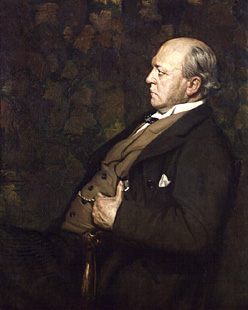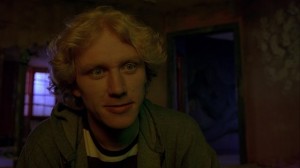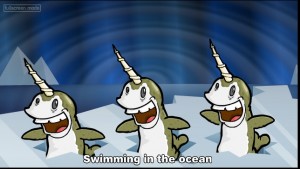A while ago I was required to do an oral presentation on Henry James for a course I was doing on Reading Fiction. The professor had set very flexible parameters for the assessment, literally saying we could could present ‘anything that resonated with you about the authors, the novels we were studying or even an aspect of them such as character development, plot, narration etc.’ One of the works we were discussing was “The Turn of the Screw” so… I decided to do my presentation on “Why I Hate Henry James”. This was the script of my oral presentation:

“I don’t know much about art but I know what I like”
Since deciding to study literature, fiction, and great books I’ve been asking myself – why do we read? More particularly, why do I read? Is it merely for entertainment? For personal enlightenment? For the edification of ourselves and others? To expand the intellect? To stimulate the imagination?
I believe it is all these things but personally, I also discovered years ago that I read because I love language and I read ever in search of an elegant turn of phrase. It need not be lengthy… or weighty… or wordy… or of any import whatsoever. Just a concise and eloquent use of the vernacular that is evocative or memorable in one form or another. Succinct in it’s meaning, delicious in its consumption… you know one when you see it as the treat tends to linger in your mind. You never know where you might encounter an epigrammatic expression and one can not be too careful in where one searches for them for “The man who does not read good books has no advantage over the man who cannot read.” (Mark Twain – 19th C. American author and humorist).
The pleasure of discovering a truly eloquent sentence has often seen me put down my book in case what follows should disappoint. Sometimes it will remain untouched for several days so I might savour the morsel a while… enjoying it’s colour, swirl, aroma and taste because “To read without reflecting is like eating without digesting.” (Edmund Burke – 18th C. English statesman, author orator and political theorist).
There is no felicity in the world comparable to being so engrossed in a book, so engaged with it’s characters and so invested in it’s plot that time slips by you and before you know it “Dawn seems to follow midnight with indecent haste.” (J. K. Rowling – 21st C. contemporary author). The hours accrue into days, which in turn add into weeks and likely months of our lives are spent reading…. Dumas on the bus, Elliot in waiting rooms, Chaucer on the internet, Flaubert over breakfast, Gaskell late into the night, Austen on holidays and Dostoyevsky, Dickens or Tolstoy to maintain perspective on tedious long haul flights betwixt listening to the monotonous modulation of the stewardess’ safety spiel and the fracas of the flight attendants fixing food… most of us read whenever a moment can be stolen.
So in my search for concise elegant use of language I tend to shun the ‘Book of the Month’ club in favour of classic literature… and I’ve discovered that ‘classic’ novels tend to become ‘classics’ with good reason. In doing so, I hope to increase the likelihood of finding the elusive and prized elegant phrases and memorable quotes which might rest awhile on the palette of my imagination.
“A room without books is like a body without a soul.” (Marcus T. Cicero – Roman philosopher, statesman, lawyer, and political theorist). For me personally, a day without time reading is a day wasted not spent. Given that our modern lives see our days largely dominated by the mundane minutiae of performing the never ending tasks of washing dishes, laundering clothes, buying groceries, paying bills, preparing meals and walking dogs etc…I covet my scant reading time and am very selective about where I choose to spend it…
Which brings me around to Mr Henry James and his impact on my quest…. It has been said that “There are two tragedies in life. One is to lose your heart’s desire. The other is to gain it.” (George Bernard Shaw – 20th C. Irish playwright and literary critic) but I contend that this assertion is in fact incorrect – for there is another great tragedy in life that this precept overlooks and that third tragedy is the torturous task of having to read something… anything… that has been penned by that most long winded and self indulgent author, Mr Henry James, whose work I have long hated with a passion.
Henry James was a US born British author, considered to be a prominent figure of 19th century literary realism. Mr James is primarily known for a series of novels which explore the relationship between America and Europe focusing on personal relationships, the ethical exercise of power, and various questions of morality through narrative consisting largely of the perception and consciousness of a character within the text.
“Few people rise in our esteem upon closer scrutiny” (French proverb) and I believe Mr James exemplifies this sentiment most excellently – for the greater my exposure to his writings and the closer I look, the lower he sinks in my regard and ‘my good opinion once lost, is lost forever.‘ (Jane Austen – English Georgian novelist).
Occasionally while reading I realize that I’m not entirely certain where the plot is going or I find myself unsure of the relevance of what I’m reading which I’m led to believe is experienced by readers the world over and therefore a not uncommon phenomena. Often this is because I am distracted or perhaps haven’t been giving the material my full attention. So, I go back and reread the last paragraph or two, or the last page or so to regain my grasp on the narrative. With a novel by Mr James however, it doesn’t matter how much I read, or reread, or how intensely I attempt to pay attention and remove myself from distractions… I’m often left feeling that his plot is either incomprehensible or absent entirely. I find his style so tedious and his writing so circumlocutory that instead of writing one or two succinct and pithy sentences, he writes some twenty to sixty corpulent ones to express a sentiment that often appears to be drearily circling a drain until eventually one feels as though the text itself has summarily sucked one’s brains out.
In fact “I should rather hear my dog bark at a crow” (William Shakespeare – Elizabethan English poet and playwright) than have to devote any further of my precious reading time to Mr James’ pastel characters, ambiguous and ambivalent storylines, not to mention his strangulative abuse of the English language with which he creates such shockingly ugly sentences that they often seem over drawn… over used… and over done. In his own words, Mr James asserts that he “hates American simplicity. I glory in the piling up of complications of every sort. If I could pronounce the name James in any different or more elaborate way I should be in favor of doing it.” and so we see he inflicts his seemingly endless logorrhea on us in a manner most deliberate.
I find it totally destroys my nerves to wade through Mr James’ novels in much the same way as “It destroys one’s nerves to be amiable every day to the same human being.” (Benjamin Disraeli – Victorian literary figure and 19th C. Convservative British Prime Minister). The unnecessarily verbose linguistic style… the inevitable confusion as our tormentor wanders off on yet another self indulgent paragraph that runs for page after page… in which a noun would be followed by pronouns surrounded by a plethora of adjectives, and prepositional clauses far from their original object or event… and one could wait forever for a verb… which would be in turn preceded by a series of adverbs demarking the drawn out detailed description of every last minute little dust mote floating around Isabel Archer’s vapid little head. The importance of which eludes me entirely.
His style seems to float aimlessly alighting briefly here, then briefly there in a manner reminiscent of an annoying mosquito buzzing around its victim unable to choose where to bite. He never seems to come to the point – if indeed he actually has one – and more often than not I quite frankly feel that I’ve not the pleasure of understanding him. “People may be made to follow a path of action, but they may not be made to understand it.” (Confucius – Chinese social philosopher. 551BCE- 479BCE) So either my intellect is too diminutive to appreciate the brilliant nuances of Mr James’ prosaic ramblings or my patience is too short to decipher them for I find he is simply ‘too cunning to be understood’! (William Shakespeare).
Mr James’ meandering and directionless plot methodology moves with the haste of molasses often giving me the impression that the author himself isn’t privy to where his story is going and given that is the case there is a sense that “If you don’t know where you are going – any road will get you there.” (Lewis Carroll – 19th C. English author, mathematician, logician, Anglican deacon and photographer). This trend is so often repeated that it likely explains why somewhere around chapter two of any one of Mr James’ novels, particularly in his latter works, I usually care not where he’s taking us but find myself just wishing he’d just stop dithering and hurry up and get us there!
But perhaps I’m being too harsh on Mr James for he is generally esteemed quite highly so there must be some genius beneath the endless verbiage. If only we could have him distilled or redacted for “gold, is to be obtained not by its growth, but by washing away from it all that is not gold.” (Leo Tolstoy – 19th C. Russian author, dramatist and educational reformer). Such an enterprise might leave us with something accessible and meaningful … though failing that option perhaps we’d best just throw him to the Reader’s Digest.
My aversion to Mr James’ novels is not a recent development. In fact my dislike of his works is so entrenched that I am always tempted to either a) pull them apart and have the satisfaction of mixing them into my compost heap; b) make a gift of them to a particularly disagreeable relative or c) donate them to a prison library, though I do believe this might constitute cruel and unusual punishment!. The more I read of Mr James’ masterpieces the stronger is my temptation to eviscerate them. Given that “The only way to get rid of a temptation is to yield to it” (Oscar Wilde – 19th C. Irish playwright, poet and author) very likely explains why my copies of A Portrait of A Lady and Washington Square are currently decorating bookshelves in the home of my mother in law…. soon to be accompanied by an unwanted copy of ‘The Turn of the Screw’.
Why his publishers encouraged him by continuing to print these long winded tomes is beyond me. How his insipid and overly dramatic works with their horrific systematic destruction of that fine institution of fictitious writing continued to get past the editors desk is a mystery. Why ’tis pure folly on the behalf of his publishers to have indulged him thus, but “As a dog returneth to his vomit, so a fool returneth to his folly” (King James Bible – Proverbs 16:11) which is why we see not one, not two, but a sum total of 23 garrulous tomes published by the heavily indulged Mr James, along with a not insignificant number of novellas.
I’m quite certain the blame ought lay with Mr James’ publishing house for “A fool can no more see his own folly than he can see his own ears” (William Makepeace Thackery – 19th C. English satirical novelist). If it is not inadvertent foolery that set Mr James on his path to destroy and offend the sensibilities of generations of readers to come, then it must be vanity that compelled him to continue to inflict his monotonous texts on an unsuspecting public. For “Provided a man is not mad, he can be cured of every folly but vanity” (Jean Jacques Rousseau – 18th C. Genavese philosopher, writer and composer). I know not whether the vice in question be foolery or vanity but in either case… Mr James has committed the crime while we, his students, do the time!
At least there is some respite from the unhealthy affliction of being forced to attend to any more of Mr James’ scribblings for “There is nothing which at once affects a man so much and so little as his own death.” (Samuel Butler – 19th C. English author, satirist and philosopher) and luckily for us the bothersome author in question croaked back in 1916 and this sort of thing tends to be a rather largish career hiccup, if you will, as death is often known to prohibit an author from publishing too many further works.
Now I am aware that my intense and vociferous distaste for Mr James’ work may be posing some offense should he have a single fan amongst us… and of course “Any fool can criticize, condemn, and complain — and most fools do.” (Dale Carnegie – 20th C. American writer, lecturer and motivational speaker) but bear with me for a moment longer as I continue to play the role of ‘complaining fool’ for I believe my utter vilification of Mr James’ is entirely justified and can be backed up with solid evidence…
In 1950 a Mr Robert Young, an undergraduate student at Stanford University made a noteworthy discovery that two chapters in Mr James’ novel ‘The Ambassadors’ (which by the way Mr James personally considered to be his most ‘perfect’ work of art) had inadvertently been printed in reverse – an unnumbered chapter was inserted before Chapter 28 when instead it ought to have been placed after Chapter 28. So the chapter in question took place in the evening and was followed by a chapter that took place in the morning and in the former chapter we see a character referring to a conversation that hadn’t yet happened.
So what you may think? Well…. the offending book in question was first published in that state with the offending chapters out of order in 1903. So basically for nigh on 50 years the error remained unnoticed. Many people read the book, perhaps discussed the book and likely students were being assigned to study the book, yet the incorrect printing order of the chapters remained unnoticed for nearly half a century.
As you can imagine, literary scholars and fans of Mr James’ works were keen to hear the opinion of the particularly observant and brilliant scholar, Mr Young on his significant discovery. Whereupon Mr Young has been recorded to have remarked: “There must be something radically wrong with a writing style that has managed to obscure an error of this magnitude for so many years from the probing eyes of innumerable readers, publishers, editors, critics, and even the author himself.” (Robert Young)
But wait… it continues! So convoluted, drawn out and tedious is the style of Mr James’ writing that when The Harper and Brothers Publishers reprinted The Ambassadors in 1955 advertising their new copy as correcting the reversed chapters, the text once more befuddled the editors and the erroneous chapter order was retained! So mind numbing and soul destroying is the act of wading through Mr James’ writing that even seasoned professionals in the publishing industry couldn’t get it straight! The knowledge of which gives me hope really, for while I may never gain an appreciation or full understanding of Mr James’ particular approach to prose – at least I know I’m not alone.
Thus, after an evening wasted… errr I mean… an evening spent, reading The Turn of the Screw, I vaguely wish I could avail myself of a device for crossing the temporal and geographical disparities that happily separate myself and Mr James for all eternity. For if I were able to access such a machine I should like the opportunity to address a few of my own thoughts to the incredulously lauded Mr James himself. Which I imagine might go something like this:
My dearest Mr James,
“I’ve had a wonderful evening, but this wasn’t it.” (Groucho Marx – 20th C. comedian and film star).
“Broadly speaking, human beings may be divided into three classes: those who are billed to death, those who are worried to death and those who are bored to death” (Sir Winston Churchill – 20th C. British Prime Minister and recipient of the Nobel Prize for Literature) and I fear Mr James you have put countless thousands squarely into this third category risking death by boredom to such a degree that Amnesty International would have been very interested in your activities had they existed prior to your expiration.
So my apologies, Mr James but one can not expect to be universally enjoyed and during my quieter reflective moments when I think back on the wonderful books and the incredible authors who’ve left an indelible mark on my thoughts, my opinions, my personal politics, even my very character… “when I think of all those people I respect the most… you’re right there, serving them drinks.” (Scott Adams – 20th C. satirist, commentator and creator of the Dilbert comic strip)
Yours etc…
borysSNORC™
Disclaimer: “If anyone disagrees with anything I say, I am quite prepared to not only retract it, but also to deny under oath I ever said it.” (T. Lehrer – 20th C. Mathematician, lecturer, song-writer and satirist) .








